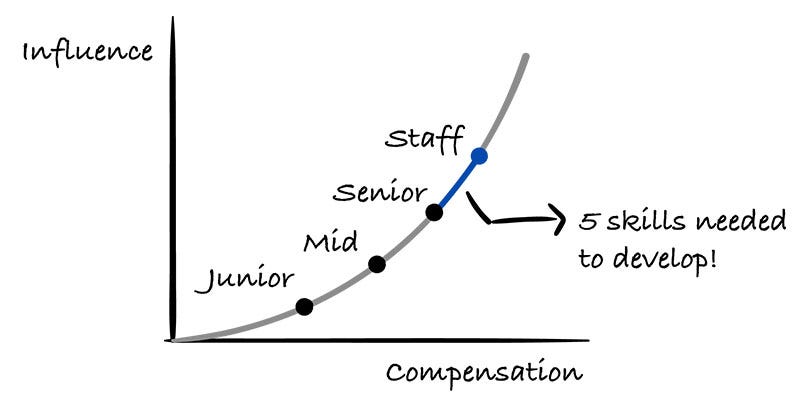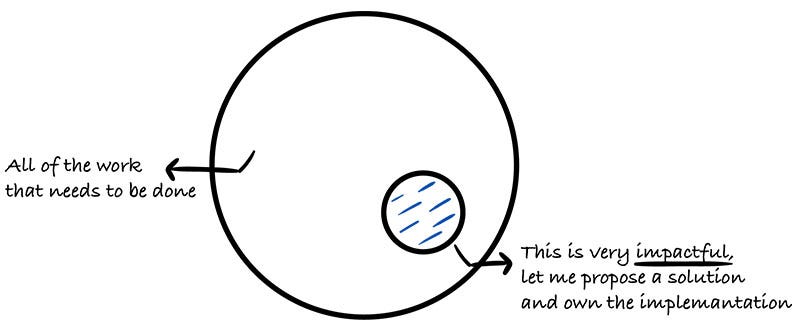5 Skills to Develop to Grow From Senior to Staff Engineer
Start your 2025 by focusing on the skills needed to grow to Staff level!
Senior Engineer to Lead: Grow and thrive in the role (15 out of 50 spots left)
Start your 2025 the right way by enrolling in the course → we start on January 21st. I’m already excited for it!
In the course, we particularly focus on the development of much needed people / communication and leadership skills in order to grow from engineer to leader!
This is the first cohort, I’ve decided to put a cap of 50 seats available, since the cohort is filling fast. Only 15 seats left!
You can enroll here:
Looking forward to seeing some of you there.
Let’s get back to this week's thought!
Intro
As I have mentioned in the Wednesday’s paid article called Become a great engineering leader in 2025, my predictions for 2025 and beyond are that engineering roles are just going to get broader and more blurred between each other.
The expectation will be to be good technically and also good in product/business, leadership and communication. And growing in the IC path (Staff+) is exactly aligned with all of the things mentioned above.
You don’t just need to be technically great, but also good at understanding the product/business, have leadership skills and your overall communication needs to be on point.
In today’s article we are diving deeper into what particular skills you need to develop in order to grow to Staff level.
To ensure we get the best insights, I’ve teamed up with Arpit Bhayani, an engineering leader, creator of DiceDB and ex-Staff Software Engineer at Google.
Before we get into Arpit’s insights, let me say a few words about the mindset shift needed in order to grow from Senior to Staff.
Growing from Senior to Staff requires a mindset shift
The more you grow in the IC path, the more you need to zoom out from team challenges to org-wide and also business challenges.
You are not judged by your individual contribution only, but you are judged by the impact and the success of the projects that you lead. It’s all about being a multiplier for others and the organization.
To me, Staff Engineers can take a very ambiguous challenge, find the right solution to it and also bring others alongside them to successfully execute the project timely and with the right quality as well.
As a manager, I see Staff Engineers as very reliable people who I can count on to make things happen without my excessive provision or needing to interfere.
Now that we know and understand the mindset shift needed, let’s get into the skills to develop to take you from Senior to Staff.
Arpit, over to you!
1. Extreme Ownership
One of the most important traits that I believe you should hold if you want to transition to Staff Engineer is - extreme ownership. It means going beyond solving tasks to driving outcomes. Here are a few things that can help you demonstrate the same.
Don’t wait for instructions. Seek out areas where you can contribute, identify gaps, and take ownership of resolving them.
Demonstrate the ability to recognize what’s needed and act decisively. Find your projects, pitch them, get them to prioritize, and execute.
Extreme ownership is about keeping everybody aligned and on the same page. So, keep sharing progress updates proactively, and flag potential risks early, without people having to ask you for the status. This minimizes miscommunication and builds trust in your ability to lead.
Acknowledge the collective achievements of the team, especially highlighting individuals who went above and beyond. Celebrating others' contributions builds a culture of collaboration and shows maturity in leadership.
One of the proxy metrics for extreme ownership, that I have tracked over the years, is the number of follow-ups from your manager. Over time, it should tend to zero.
2. Ruthless Execution
To grow into a Staff Engineer role, ruthless execution is a critical skill. It’s about driving work to completion and not letting things hang. Here are a few things that will help you demonstrate the same.
When you’re responsible for a piece of work, make it your mission to know its exact status at all times. Be aware of - what has been completed, what is blocked and why, estimated timelines for each, etc. This makes sure you are on top of things, no matter what.
Remember, People do what is tracked. If you loosen your grip, even highly driven individuals can become complacent over time.
Maintain visibility into every project you lead, but balance this with empathy - track progress to enable, not micromanage. As a staff engineer, making sure the project keeps making progress is non-negotiable.
Ruthless execution is also about - keeping everyone involved aligned. So proactively keep people aligned to reduce confusion, mitigate risks, and reinforce trust in your ability to execute.
Mission-critical projects are always given to someone who has the history to deliver.
For every project I ever led, there is always one document that contains every single key detail that anyone can refer to see what’s happening. I always took it upon myself to update it.
This way, I made sure I was on top of every single thing happening in the project. The granularity of details was dependent on what I was leading.







